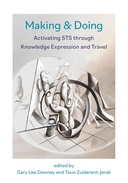Explore

Making & Doing
0 Ungluers have
Faved this Work
Login to Fave
How ten making & doing projects expand STS scholarship through a focus on knowledge expression and knowledge travel in addition to knowledge production. Making & doing projects expand STS scholarship to include the trajectories of STS knowledge flow beyond the boundaries of the field by actively interweaving knowledge expression and travel with knowledge production. In this edited volume, contributors from around the world present and critically assess ten empirical making & doing projects. They recount how their projects advance STS, and describe how they themselves learn from their interlocutors and the settings in which they do and share their STS work. A coda explains how the infrastructures of STS scholarship are broadening to include practices of making & doing. The contributors examine and reflect upon their dilemmas, frustrations, and failures, especially when these generate new practices that might not have occurred had their work not taken the form of making and doing scholarship. While each project raises a distinct set of scholarly issues, all of the projects include practices that express STS knowledge through “STS sensibilities” and attach those sensibilities to practices in empirical fields. The projects include one each in Argentina, Taiwan, Canada, and Denmark; two in the US; one in Austria, the UK, and multiple countries in Africa and Asia; one in the US and Latin America; one in the Netherlands and Australia; and one in an international network that includes members from Europe, the Americas, and Australia. Contributors Gary Lee Downey and Teun Zuiderent-Jerak; Yi-Ping Lin and Hsin-Hsing Chen; Dawn Nafus, Michael Guggenheim, Judith Kröll, and Bernd Kräftner; Hernán Thomas, Lucas Becerra, and Paula Juárez; Torben Elgaard Jensen, Andreas Birkbak, Anders Koed Madsen, and Anders Kristian Munk; Max Liboiron, Emily Simmonds, Edward Allen, Emily Wells, Jess Melvin, Alex Zahara, and Charles Mather; Jessica Mesman and Katherine Carroll; Nicholas Shapiro
This book is included in DOAB.
Why read this book? Have your say.
You must be logged in to comment.
Editions

